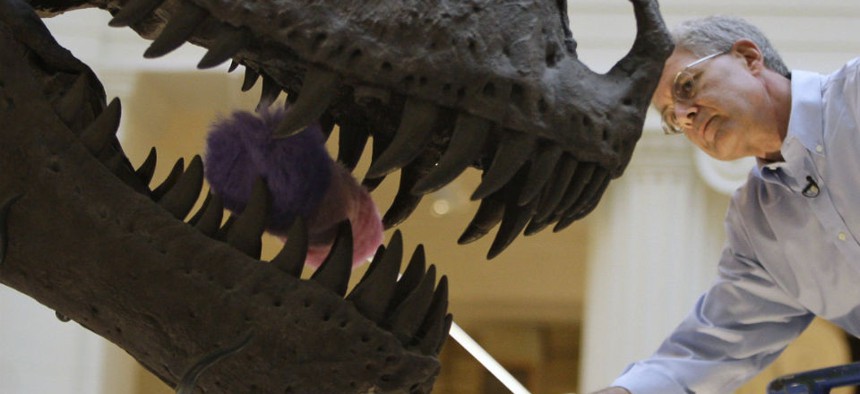This 67-Million-Year-Old Dinosaur Is Headed to Space

Bill Simpson, collections manager of fossil vertebrates at Chicago's Field Museum, dusts the teeth of the Tyrannosaurus rex skeleton known as Sue. Kiichiro Sato/AP File Photo
Well, a few microscopic parts of it are.
Dinosaurs once ruled the Earth. Now, 67 million years later, one of them is leaving it.
Microorganisms from a Tyrannosaurus rex fossil skeleton nicknamed Sue will be launched into space on Monday, headed for the International Space Station. The microbe paenibacillus mucilaginosus, now found in agriculture fertilizers, was collected from a swab from the surface of the dinosaur's bones. It will travel aboard the SpaceX Falcon 9, a rocket built by a private U.S. spaceflight company and supported by NASA.
The launch from Florida's Cape Canaveral was scheduled for 4:58 p.m. EST.
Sue's microbes were set to join 48 other kinds of microorganisms in their journey to outer space, a venture made possible by Project Mercurri, a nationwide effort led by Science Cheerleader, a group of current and former NFL and NBA cheerleaders pursuing careers in science. The other microbes were collected from an amusingly diverse range of sources, including various U.S. sports stadiums, the Liberty Bell, a candy jar from the set of NBC's The Today Show, and one lucky toilet in California. Scientists plan to study their behavior in microgravity to better plan for long-term human space travel.
The rest of Sue resides in the Field Museum in Chicago. Her skeleton is the largest, most complete, and best preserved T. rex fossil ever found. It was discovered in South Dakota's Badlands National Park, a hot spot for dinosaur remains, in 1990.
When the 600-pound skeleton arrived at a New York City auction house seven years later, museum officials came ready to outbid their competitors. The Smithsonian's National Museum of Natural History was prepared to pay $2.5 million to bring the first T. rex to the nation's capital, but the Field Museum crushed its offer, securing Sue with a cool $8.3 million.
Almost 17 years after its loss to Chicago, the D.C. museum is finally getting its own T. rex, a 65-million-year-old fossil found in Montana, this week. But in a way, the Field Museum is still ahead. D.C.'s new dinosaur is only traveling cross-country. Sue, on the other hand, is leaving the Earth's atmosphere.



